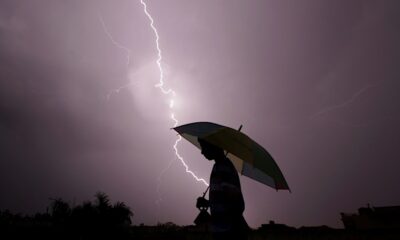Business
Energy Transition Demands $1.2 Trillion for Battery Storage

According to a recent report by Wood Mackenzie, the global energy transition will require an investment of approximately $1.2 trillion in battery storage to support over 5,900 GW of new wind and solar installations over the next decade. This demand comes as the world increasingly shifts towards low-carbon energy sources, with experts predicting a significant rise in battery storage solutions to address the intermittent nature of renewable energy.
The Bloomberg New Energy Finance has previously indicated that wind and solar energy could contribute to half of the world’s electricity generation by mid-century. As these renewable sources become dominant, the need for large-scale energy storage systems becomes critical. Currently, the power sector faces a capacity gap of 1,400 GW for battery installations required to achieve grid stability by 2034. This situation presents a substantial market opportunity as nations focus on enhancing battery investments to support the growth of renewable generation.
Falling costs further bolster the case for battery storage. Wood Mackenzie reported that prices for battery energy storage have decreased by an average of 10% to 40% across various global markets over the past year. In the United States, the utility-scale battery storage capacity has surged by 15-fold over the last five years, reaching nearly 30,000 MW (30 GW) due to declining battery costs. Nineteen states have now installed at least 100 MW in utility-scale battery storage during this period.
Despite this growth, the future of the U.S. battery production sector appears uncertain following the implementation of the Inflation Reduction Act in 2022. This act has altered many clean energy credits, significantly impacting battery manufacturing. Specifically, the recently passed OBBBA is projected to phase out numerous tax credits and funding for clean energy and electric vehicle (EV) production while simultaneously promoting fossil fuels.
The International Council on Clean Transportation estimates that the OBBBA could lead to a decline of approximately 75% in U.S. battery production, projecting a drop from earlier estimates of 1,050 GWh by 2030 to just 250 GWh. This decline is expected to coincide with a 40% reduction in EV sales compared to previous projections.
Construction of nearly 130 battery manufacturing facilities is currently underway in the United States, though less than half have begun operations. States such as Texas, Michigan, Tennessee, Georgia, Kentucky, and Nevada are likely to be most adversely affected by the OBBBA cuts.
The implications of the OBBBA are complex. While it phases out credits for critical minerals used in batteries starting in 2031, it also maintains credits for battery modules and other components, encouraging domestic integration.
In contrast, China has taken a different approach to grid stabilization. Over the past year, the country has commissioned 24.6 GW in new global hydropower capacity, accounting for nearly 60% of the total worldwide. Of China’s 14.4 GW additions, 7.75 GW comes from pumped storage hydropower (PSH), a cost-effective and long-duration energy storage method that offers greater potential than lithium-ion batteries.
As China aims for carbon neutrality by 2060, it is rapidly increasing hydropower construction. By the end of 2023, China had an installed hydropower capacity of 436 GW, which constitutes more than a third of its total 1,200 GW combined wind and solar capacity. A recent report from the International Hydropower Association indicates that China’s revised energy policies, effective from January 2025, will further incentivize the development of PSH projects.
The contrasting trajectories of battery storage investment illustrate the complexities and challenges facing the global energy transition. As the world grapples with the necessary infrastructure to support renewable energy, the demand for significant investments in battery storage remains paramount.
-

 Politics4 weeks ago
Politics4 weeks agoSecwepemc First Nation Seeks Aboriginal Title Over Kamloops Area
-

 World5 months ago
World5 months agoScientists Unearth Ancient Antarctic Ice to Unlock Climate Secrets
-

 Entertainment5 months ago
Entertainment5 months agoTrump and McCormick to Announce $70 Billion Energy Investments
-

 Science5 months ago
Science5 months agoFour Astronauts Return to Earth After International Space Station Mission
-

 Lifestyle5 months ago
Lifestyle5 months agoTransLink Launches Food Truck Program to Boost Revenue in Vancouver
-

 Technology3 months ago
Technology3 months agoApple Notes Enhances Functionality with Markdown Support in macOS 26
-

 Lifestyle3 months ago
Lifestyle3 months agoManitoba’s Burger Champion Shines Again Amid Dining Innovations
-

 Top Stories2 months ago
Top Stories2 months agoUrgent Update: Fatal Crash on Highway 99 Claims Life of Pitt Meadows Man
-

 Politics4 months ago
Politics4 months agoUkrainian Tennis Star Elina Svitolina Faces Death Threats Online
-

 Sports5 months ago
Sports5 months agoSearch Underway for Missing Hunter Amid Hokkaido Bear Emergency
-

 Politics5 months ago
Politics5 months agoCarney Engages First Nations Leaders at Development Law Summit
-

 Technology5 months ago
Technology5 months agoFrosthaven Launches Early Access on July 31, 2025




















